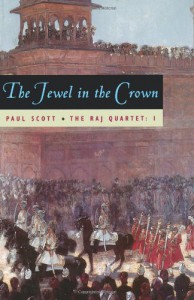Nicole~

India is The Jewel in the Crown.
It signified the Crown's most precious dominion of the Victorian era -
its control, forced conformity,
"civilizing" and exploitation of India.

Missionary Edwina Crane's semiallegorical picture titled "The Jewel in Her Crown"
In 1942, the end of Empire was imminent, becoming a reality; the only justifiable reason for the British remaining in India was to defeat the Japanese threat of invasion. But, the Indians had lost faith in imperial justifications, their riotous emotions stirred up by Gandhi's seditious slogan: "Quit India". He suggested that the British should leave India "to God or to anarchy."
Scott picked this specific rebellious time to place the rape of the English woman- Daphne Manners- by a rioting gang of Indian "savages"; the brutal beating and framing of her lover- an anglicized, well educated, sophisticated Indian man, Hari Kumar- and the pursuant, violent aftermath between civilians and the police force, led by the arrogant, bigoted, less educated Brit, Ronald Merrick. These events play out as metaphors of white - black relationships and prejudice, superiority and forced submission, resentment and contempt, power and injustice, divide and rule.
"There was nothing to conform with, except an idea, a charade played around a phrase: white superiority... India had reached flash point. It was bound to because it was based on a violation. A white man in India can feel physically superior without unsexing himself. But what happens to a woman if she tells herself that 99% of the men she sees are not men at all, but creatures of an inferior species whose color is their main distinguishing mark? What happens when you unsex a nation, treat it like a nation of eunuchs? Because that's what we've done, isn't it?"
- Daphne Manners
Paul Scott had an impressive handle on the political history of India. His rich characters and themes were well constructed but complex in nature (I do like an allegory, of which there are many). For example, Hari is Indian born, raised in England, educated at a prestigious school and speaks English better than the Brits. He has difficulty finding work back in India because he doesn't speak Hindi. He lacks understanding of his identity and feels like a nobody. Because of the color of his skin, he feels "invisible". He is the hybridized product of England and India. As such, he is both the pride and the failure of imperialism. "Hari", or what he represents, is what this novel is about.
"There is a salvation of a kind for a boy like him. He is the leftover, the loose end of our reign, the kind of person we created -I suppose for the best intentions...
The worst aspects of our colonialism will just evaporate into history as imperial mystique, foolish glorification of a severely practical and greedy policy."
- Ethel Manners
I highly recommend the Jewel in the Crown - I'll definitely be reading the rest of the Raj Quartet.
 2
2



